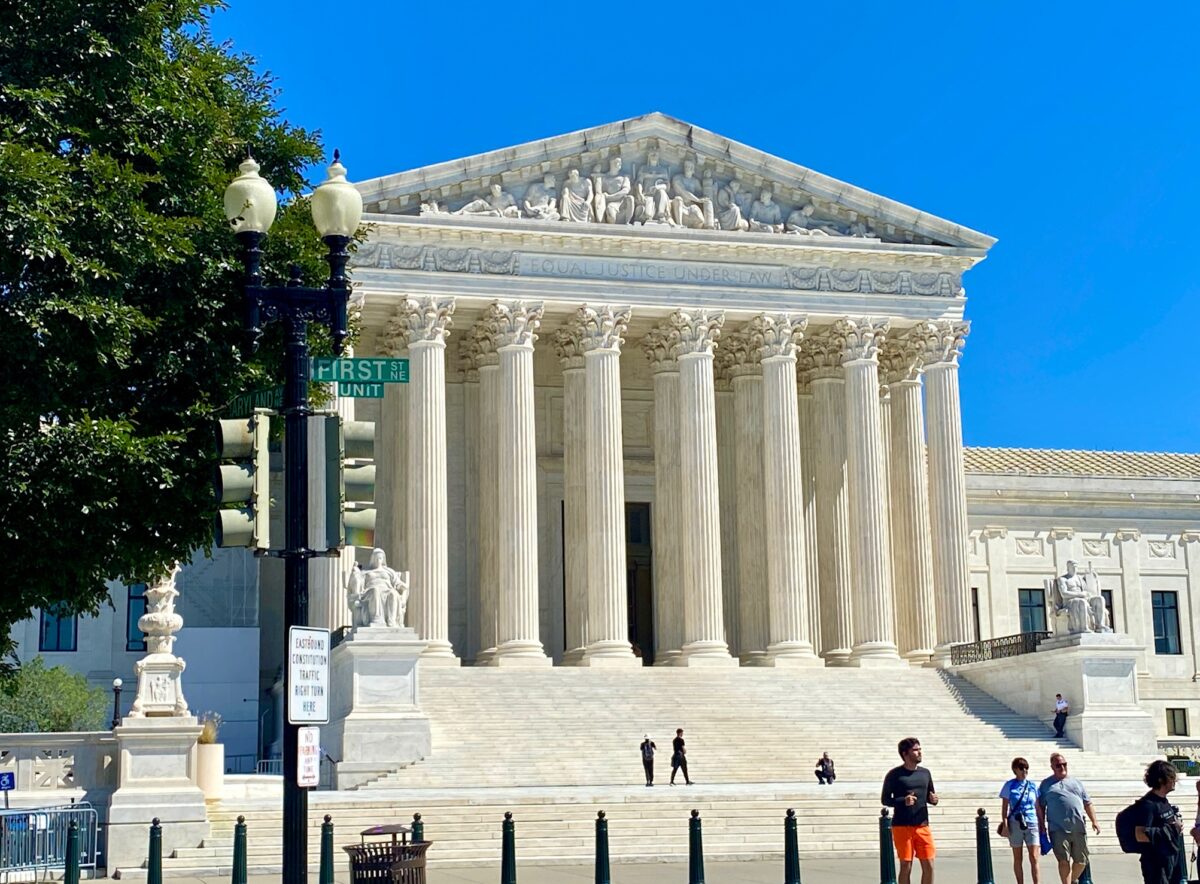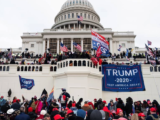By Glynn Wilson –
WASHINGTON, D.C. — On the same day when President Joe Biden addressed the nation from Valley Forge warning about the existential threat to democracy posed by Donald Trump, the United States Supreme Court chose to try to usurp the news in a Friday afternoon announcement that it would indeed take up the case of whether Trump belongs on the presidential election ballot in Colorado.
The decision could have profound implications for the next election in state after state. Maine has already issued a similar decision booting Trump from the ballot under the 14th Amendment for engaging in a seditious conspiracy and inciting a violent insurrection against democracy on Jan. 6, 2021, and other states are considering it too, including Illinois, Massachusetts and Michigan.
In contrast to what Trump and other Republicans are saying about the case, the Democrats are not behind this effort to prevent Trump from appearing on the ballot in those states. The case involves a dispute between Republicans in Colorado who are fighting over whether Trump should appear on the state Republican primary ballot, not the general election ballot.
According to deadline coverage from inside the Supreme Court by the New York Times, the justices agreed to thrust the court into “a pivotal role that could alter the course of this year’s presidential election.”
“The sweep of the court’s ruling is likely to be broad,” wrote Adam Liptak, the Times‘ long-time Supreme Court correspondent in the Washington bureau. “It will probably resolve not only whether Mr. Trump may appear on the Colorado primary ballot after the state’s top court declared that he had engaged in insurrection in his efforts to subvert the 2020 election, but it will most likely also determine his eligibility to run in the general election and to hold office at all.”
Not since Bush v. Gore, the 2000 decision that handed the presidency to George W. Bush, has the Supreme Court taken such a central role in an election for the nation’s highest office, the Times reports. The case will be argued on Feb. 8, and the court will probably decide it quickly. The Colorado Republican Party had urged the justices to rule by March 5, when many states, including Colorado, hold primaries.
The number of challenges to Trump’s eligibility across the country can only have added pressure on the court to hear the Colorado case, as they underscored the need for a nationwide resolution of the question. The case is one of several involving or affecting Trump on the court’s docket or on the horizon.
An appeals court will hear arguments on Tuesday on whether he has absolute immunity from prosecution, and the losing side is all but certain to appeal. And the court has already said that it will rule on the scope of a central charge in the federal election-interference case in a decision expected by June.
Trump asked the Supreme Court to intervene after Colorado’s top court disqualified him from the ballot last month. That decision is on hold while the justices consider the matter.
Jena Griswold, Colorado’s secretary of state, pressed the Supreme Court to act quickly.
“Coloradans, and the American people, deserve clarity on whether someone who engaged in insurrection may run for the country’s highest office,” she said in a statement.
Trump acknowledged the court’s decision to hear the case at a rally Friday in Sioux Center, Iowa, saying he hoped the justices would fairly interpret the law.
“All I want is fair; I fought really hard to get three very, very good people in,” he said, referring to his appointees. “And I just hope that they’re going to be fair because, you know, the other side plays the ref.”
In truth, it is only the Republican Party under Trump that seems hell bent on destroying the reputation of the entire justice system in the U.S. by abusing the courts for partisan advantage.
The case turns on the meaning of Section 3 of the 14th Amendment, ratified after the Civil War, which bars those who had taken an oath “to support the Constitution of the United States” from holding office if they then “shall have engaged in insurrection or rebellion against the same, or given aid or comfort to the enemies thereof.”
Congress can remove the prohibition, according to the provision, but only by a two-thirds vote in each chamber.
In an editorial guest opinion piece published in the Times, Gerard N. Magliocca, who has researched Section 3 of the 14th Amendment extensively and is the author of two legal papers on the provision, argues that only Congress can exempt Trump from being held accountable under the 14th Amendment, not the courts.
Though Section 3 addressed the aftermath of the Civil War, it was written in general terms and, most scholars say, continues to have force.
The Colorado Supreme Court affirmed the first part of the ruling, confirming that Trump had engaged in an insurrection. He set out to overturn the result of the 2020 presidential election by trying to alter vote counts, encouraging bogus slates of competing electors, pressuring the vice president to violate the Constitution; and calling for the march on the Capitol.
But the majority reversed the part of the decision that said Section 3 did not apply to the presidency.
“President Trump asks us to hold,” the majority wrote in an unsigned opinion, “that Section 3 disqualifies every oath-breaking insurrectionist except the most powerful one and that it bars oath breakers from virtually every office, both state and federal, except the highest one in the land. Both results are inconsistent with the plain language and history of Section 3.”
The State Supreme Court addressed several other issues. Congress does not need to act before courts may disqualify candidates, it said. Trump’s eligibility is not the sort of political question that is outside the competence of courts. The House’s Jan. 6 report was properly admitted into evidence, and Trump’s speech that day was not protected by the First Amendment, the court ruled, adding that states are authorized under the Constitution to assess the qualifications of presidential candidates.
“Were we to adopt President Trump’s view,” the majority wrote, “Colorado could not exclude from the ballot even candidates who plainly do not satisfy the age, residency and citizenship requirements” of the Constitution.
An election official in Maine last month adopted much of the Colorado Supreme Court’s reasoning in barring Trump from the primary ballot there. He has appealed that ruling to a state court.
In urging the Supreme Court to hear the Colorado case and to resolve it quickly, Trump’s lawyers cited the ruling in Maine.
“The Colorado Supreme Court decision would unconstitutionally disenfranchise millions of voters in Colorado and likely be used as a template to disenfranchise tens of millions of voters nationwide,” the lawyers wrote. “Indeed, the Maine secretary of state, in an administrative proceeding, has already used the Colorado proceedings as justification for unlawfully striking President Trump from that state’s ballot.”
The case, Trump v. Anderson, No. 23-719, presents an unusually large number of intricate and overlapping legal issues, and the parties disagreed about which ones the court should address. The court’s order granting review did not specify which issues it agreed to hear. Unless it clarifies matters in a later order, the briefs and arguments will most likely be “sprawling.”
Trump’s opening brief on the merits is due on Jan. 18, and lawyers for the six voters who prevailed in the Colorado Supreme Court must respond by Jan. 31.
In their response to Trump’s petition, the voters’ lawyers said they counted “at least seven discrete legal and factual issues” pressed by Trump, asking the justices to limit their review to five of them. The questions the justices will confront include whether the events culminating in the assault on the Capitol on Jan. 6 were an insurrection and whether Trump engaged in them. He disputed both in his petition.
“‘Insurrection’ as understood at the time of the passage of the 14th Amendment meant the taking up of arms and waging war upon the United States,” the petition said, noting that the amendment had been adopted after “the United States had undergone a horrific civil war in which over 600,000 combatants died, and the very survival of the nation was in doubt.”
The voters’ brief argued the opposing view.
“Trump’s intentionally mobilizing, inciting and encouraging an armed mob to attack the United States Capitol on Jan. 6 satisfies the legal definition of ‘engaging in insurrection,’” the brief said.
The justices can decide the case without addressing either issue. They could, for instance, say that the matter is a political question not fit for judicial resolution, that courts are not free to act unless Congress enacts legislation or that Section 3 does not apply to the presidency.
Trump’s lawyers argued that Section 3 at most disqualified people subject to it from holding office — not from seeking it. If he were elected, the petition said, Congress could remove his disqualification before his term began.
The voters’ brief said that analysis defied logic.
“Because Trump is not qualified to hold the office of president,” the brief said, “he is not a ‘qualified candidate’ under the Colorado Election Code.”
___
If you support truth in reporting with no paywall, and fearless writing with no popup ads or sponsored content, consider making a contribution today with GoFundMe or Patreon or PayPal. We just tell it like it is, no sensational clickbait or pretentious BS.














